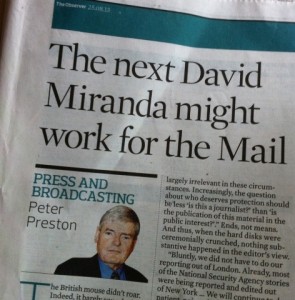A key ingredient of a democratic society is the existence of free media that can hold power to account. One essential requirement for free media is the ability of journalists to protect the identity of their sources – a contemporary equivalent of the sanctity of the confessional in earlier times, but with a public interest dimension. The existence of comprehensive surveillance – plus the legal intimidation that goes with it (a la Miranda) – makes it impossible to protect confidential sources. That’s why WikiLeaks’s development of a secure, anonymous drop-box was such a significant innovation. But, given what we now know about the capabilities of the NSA and GCHQ, I don’t think any journalist could now, in good faith, give an undertaking of confidentiality to any source with whom s/he communicated electronically.
One big puzzle for me is why so many journalists – at least in Britain – don’t seem to appreciate how radical the threat to journalism has become. After all – as Peter Preston pointed out in a terrific column yesterday – the next David Miranda might be working for the Daily Mail.
In the British case, there are probably local factors at work – in particular the visceral hatred that the tabloid press has for the Guardian. [Full disclosure: I write for the Observer, which is a sister paper of the Guardian.]
You think I jest? A few years ago, one of the people who worked most closely with Tony Blair when he was prime minister observed to one of my academic colleagues that during the Blair premiership one rule-of-thumb for news management in Downing Street was that “the best way to bury a story was to have it published on the front page of the Guardian“. When my colleague expressed puzzlement, he explained: “because then the Daily Mail wouldn’t touch it”.

